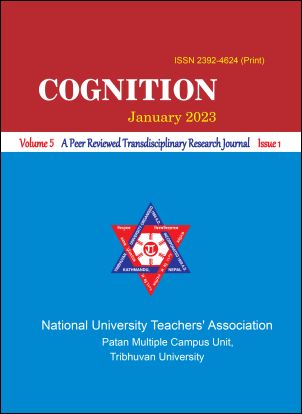The Intersection of Blues and Gospel in Langston Hughes's Poetry
DOI:
https://doi.org/10.3126/cognition.v5i1.55409Keywords:
Harlem Renaissance, African-American culture, blues, identityAbstract
This article delves into Langston Hughes's use of blues and gospel music in his poetry. It explores how his poetry has helped challenge traditional views of African-American art. Hughes promotes African-American identity and culture, and advocates for principles such as freedom, democracy, and brotherhood. Hughes's poetry celebrates both spirituals and the blues, recognizing their power to evoke emotions and capture the essence of the human spirit. Despite the differences between the two genres, Hughes sees a greater bond that unifies them as part of the broader African-American culture. Hughes believes that his poetry should be performed and recited with musical accompaniment to enhance and strengthen communication. In this sense, music serves as a strong and unifying force that can inspire participation, dialogue, and engagement with African-American culture. This article examines how Hughes's poetry reflects the blues and gospel traditions and how his art is not isolating but ultimately unifying. By analyzing specific poems, such as "The Weary Blues" and "The Negro Speaks of Rivers," this article demonstrates how Hughes's use of blues and gospel music speaks to a broader cultural context and how it is an integral part of African-American identity. Furthermore, the article highlights how Hughes's work has been influential in promoting African-American culture and identity. Through his poetry, Hughes seeks to challenge traditional views of art and African-Americans by asserting that African-American culture is worthy of artistic representation. His use of music in his poetry helps to underscore the importance of music as a part of African-American culture, and to foster a sense of community and unity among African-Americans. This article illustrates how Hughes's poetry is not only a reflection of the blues and gospel traditions but also a representation of African-American identity and culture. Hughes's use of music in his poetry helps to break down cultural barriers and promote unity and engagement within the African-American community.




